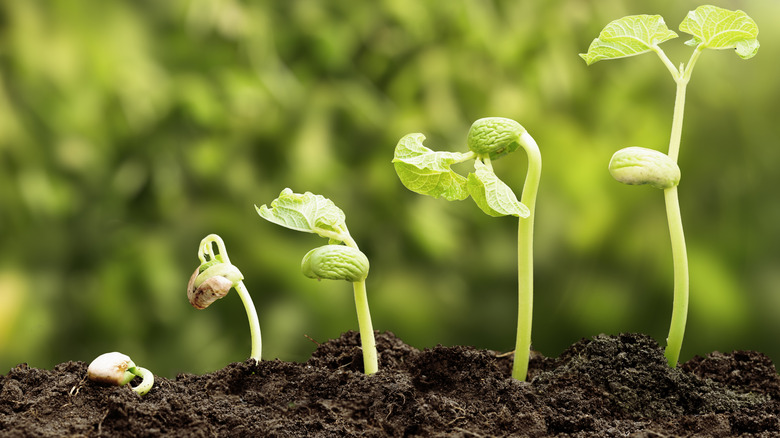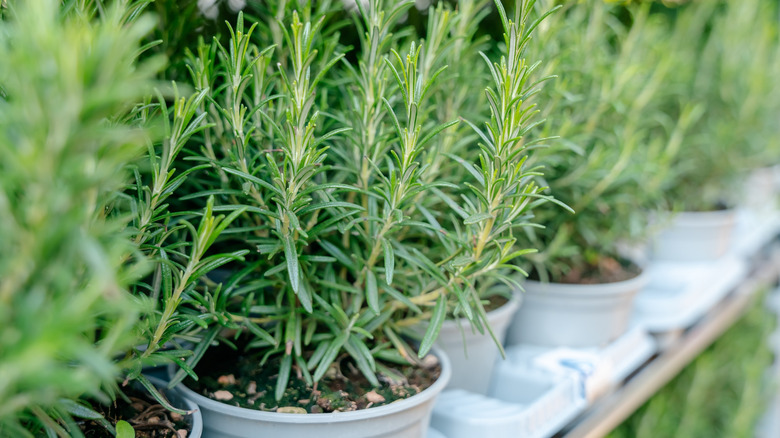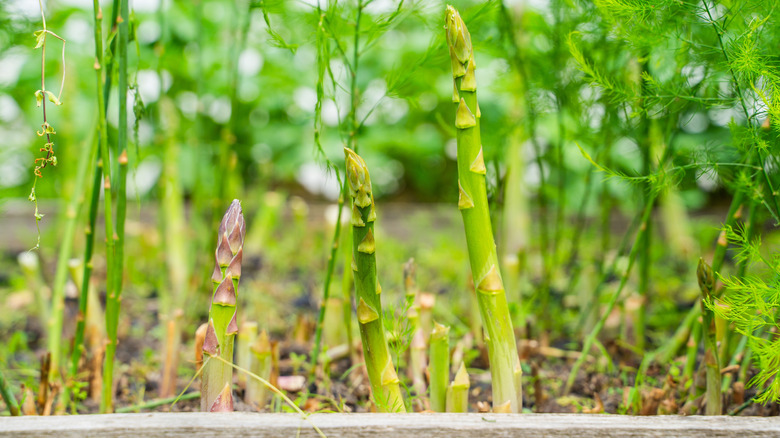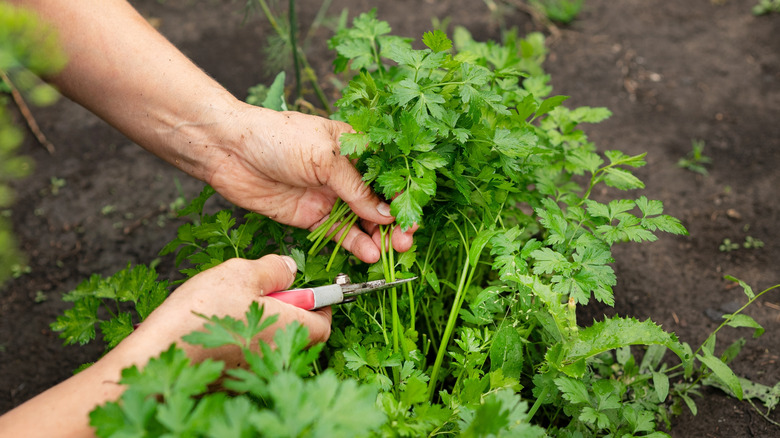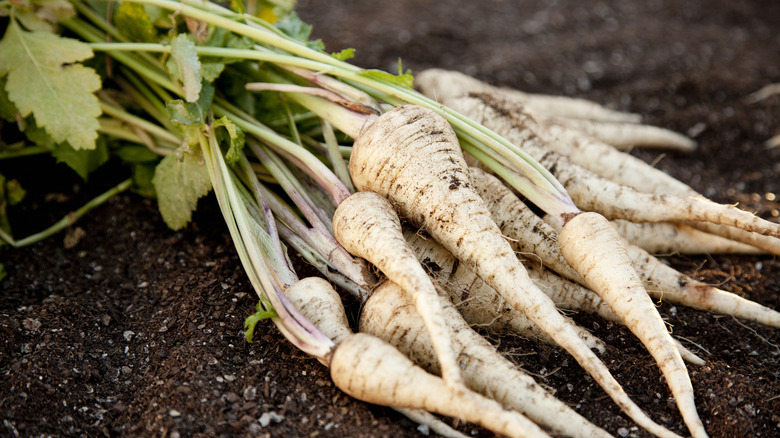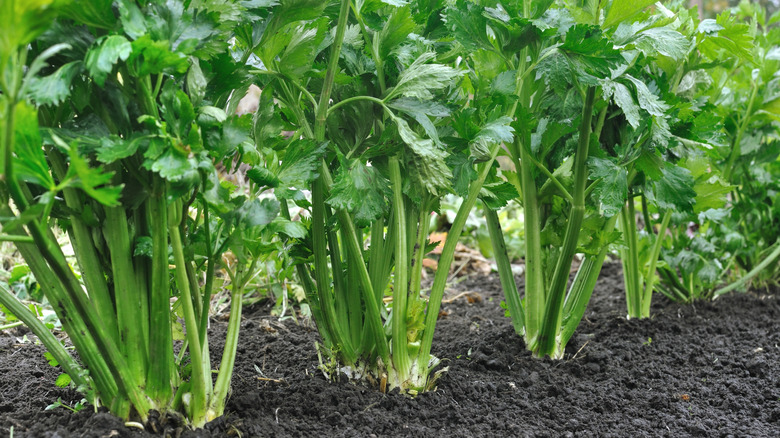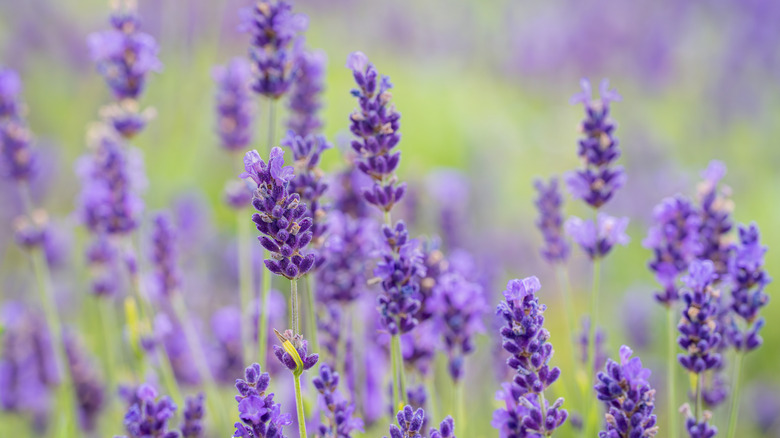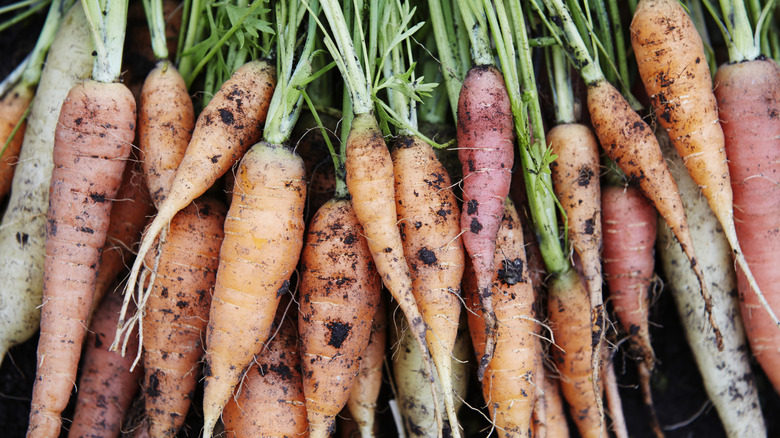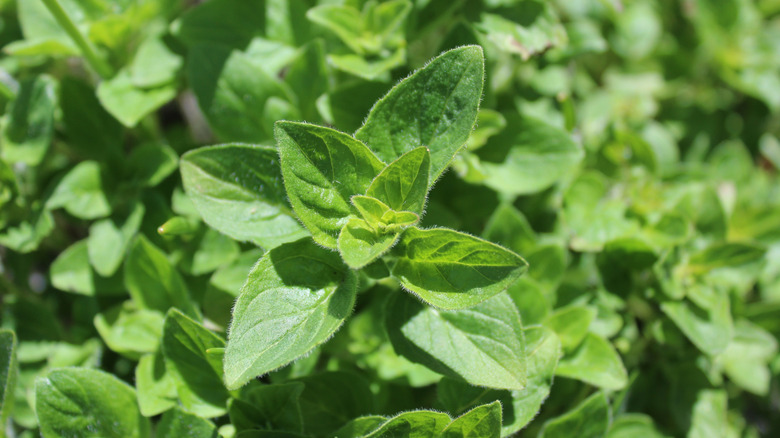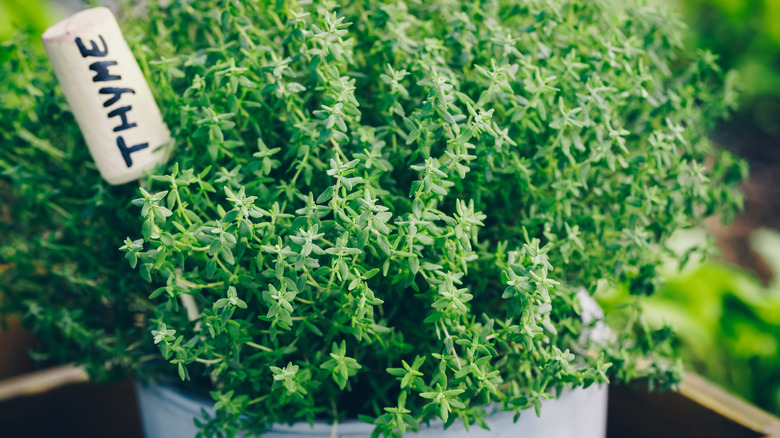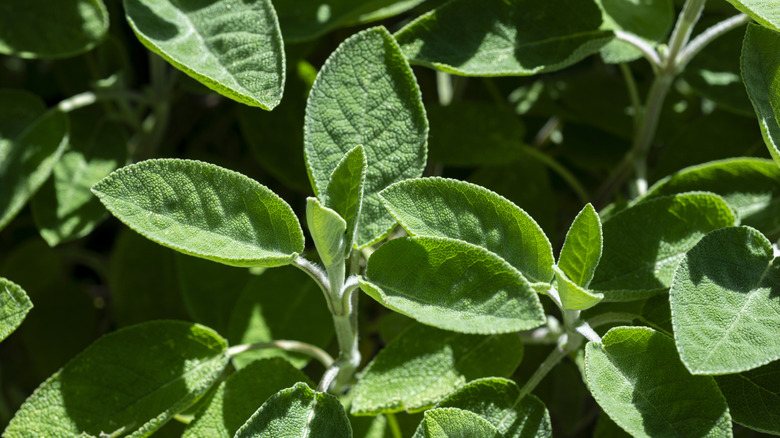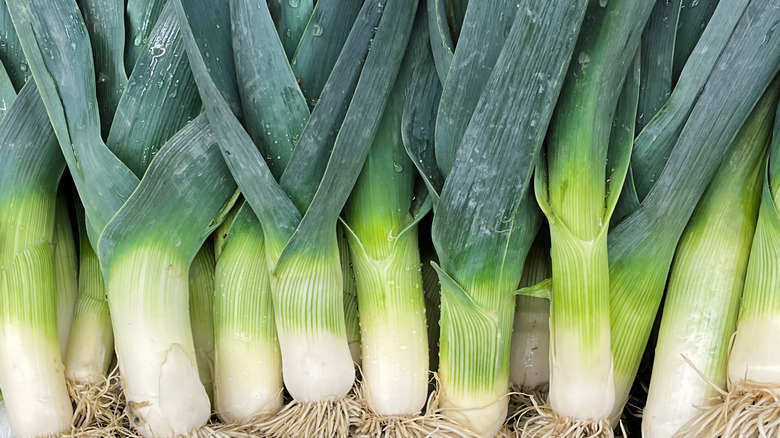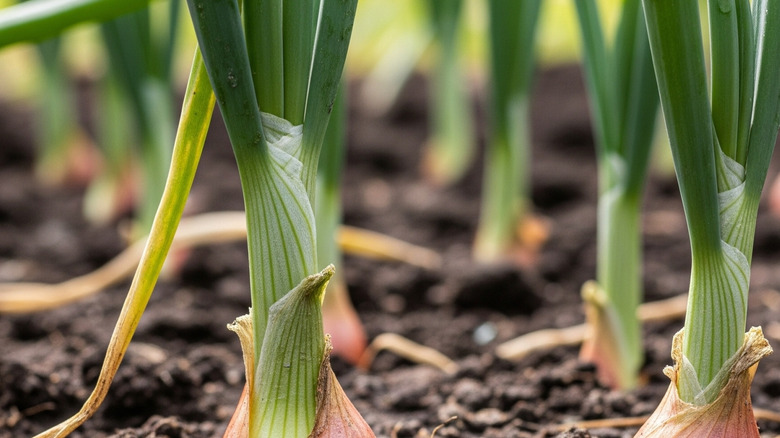12 Seeds That Take A Long Time To Germinate
As a gardener, one of the most gratifying things you can do is grow your plants from seed. Watching the process of starting green, new life from first germination to harvest is like being witness to a miracle. However, depending on what plants you choose for your garden, you might have a long wait to see any payoff. Some types of vegetation, like rosemary, celery, and asparagus have very long germination times, long enough to make even a seasoned gardener impatient.
Germination is the process by which the seed begins to sprout after being planted, and there are many benefits of starting seeds instead of buying plants. It can be extremely cost-effective as well as gratifying. You might even want to consider using tricks to increase seed germination rates on plants that take their sweet time to break the surface of your soil. And if you are choosing to start your seeds indoors this year, just be aware that there are a few plants you'll need to practice a little more patience for — there are many plants with long germination times that make wonderful additions to any garden and can absolutely be worth the wait.
Rosemary
Rosemary (Salvia rosmarinus) is a wonderful herb to have in your garden for many reasons. It adds tremendous flavor to culinary creations, pollinators love it, and it is extremely hardy. While this evergreen shrub can grow up to 5 feet tall, it is notoriously difficult to start from seed. It can take up to four weeks to germinate and you won't be able to harvest any fresh rosemary until its second season. This is why many gardeners choose to propagate or buy an already established plant to add to their garden.
Asparagus
Asparagus (Asparagus officinalis) is a favorite vegetable among patient gardeners. This is another plant that takes a minimum of two years to grow to maturity, and if you are growing them from seed, you will need to add an extra year to that time. It takes up to three weeks for asparagus seeds to germinate if using proper starting methods, such as a warming mat, which is essential. But once you have an established asparagus bed in your garden, you can harvest from them for almost 20 years!
Parsley
Parsley (Petroselinum crispum) is not just a green that used to grace culinary dishes as decoration in days gone by. It's also a wonderfully tangy addition to salads, butters, and dressings. But if you're considering adding this tasty green to your garden, it might require a little patience, as it can take up to five weeks for planted seeds to germinate.
Parsnip
A seemingly old-fashioned root vegetable, parsnips (Pastinaca sativa) have been seeing a resurgence in popularity over the last decade. They were extremely popular before potatoes and their cousin, the carrot, came on the culinary scene. Now, once again, they are becoming popular among home gardeners as a must-plant veggie. They do, however, have a long germination time — up to three weeks to pop above the soil. If you're willing to have a little patience, you too can add this cool-weather crop to your culinary repertoire.
Celery
Celery (Apium graveolens) is considered an extremely needy plant (needing very precise soil temperatures and is prone to bolting) and usually only gardeners with a couple seasons under their belt attempt to cultivate this vegetable. It has a lengthy germination time of 20 to 30 days. If you are daring enough to grow this veggie, it makes a great addition to soups, salads, and other dishes. Your home-grown celery won't necessarily look like the long stalks you can purchase in the store, but it will have a more complex flavor and be rich in color.
Lavender
Lavender (Lavandula) is an herb that many people find beneficial to grow in their gardens. It is great to have on hand for many herbal crafts, smells great, has beautiful purple flowers, and can help keep pests out of your garden. But like all of the plants on this list, it can be a little slow to get started from seed. Lavender can take up to four weeks or longer to germinate. When your lavender is approximately 3-inches in height, it can be transplanted into your garden.
Carrots
Absolutely nothing beats the taste of a fresh carrot (Daucus carota) straight from the garden, grocery store carrots don't even come close. It's no wonder it is always on the list of seeds to buy for every gardener. With a sweet flavor and a huge variety of species to choose from, who wouldn't grow this amazing vegetable. Carrots do require a little patience though, as they usually take at least 2 weeks to germinate, sometimes three. As long as you keep their soil moist, and it stays above 40 degrees Fahrenheit, you should have no problem getting carrots to prosper.
Oregano
A well-loved herb by those who adore Mediterranean cuisine, oregano (Origanum vulgare) is an absolute must in the herb garden. Not only is it hardy and has an amazing scent, but this perennial can provide you with fresh leaves for many years. It is also a pollinator favorite. Although oregano is considered an easy plant to maintain, it might take a little patience on your part to get this plant sprouting. Oregano seeds can take a week or two to germinate and you should cover them very lightly with soil, as they need light to germinate.
Thyme
Thyme (Thymus vulgaris) is another wonderful herb that has many uses. Many people think of thyme for its culinary applications, but it can also be used for herbal remedies. Like the other woody herbs on our list, thyme takes a bit of patience to grow. But once established, you'll get to enjoy this perennial for years to come. It takes up to two weeks or more for thyme to begin to sprout. Once transplanted into your garden they are pretty easy to grow, just remember to protect them through winter if you live in a colder climate.
Sage
Sage (Salvia officinalis) is another wonderful herb that takes a little patience to grow. A welcome addition to any herb garden, sage can be a little finicky to get started. It takes about 10 to 21 days before sage seeds will germinate. They are ready to be transplanted into your garden when they are about 4 inches high and have developed a couple sets of strong leaves. Make sure you do not put them into the ground until after the risk of frost has passed. Once established, this perennial should provide you with culinary spice for multiple years.
Leeks
Leeks (Allium ampeloprasum) are thick, stalky-necked cousins in the onion family. They have an amazing, subtle onion flavor that is best utilized in soups or stews. Not as popular in gardens as other onion varieties due to their finicky nature and incessant need for moisture. However, with a little patience and stubbornness, this vegetable is a wonderful addition to any table. Seeds can take up to two weeks to germinate and benefit from weed-free, well-drained soil — just remember to water the soil 6 inches deep. This veggie is perfect if you prefer a milder onion flavor in your dishes.
Shallots
Shallots (Allium cepa) are a favorite variety of onion among French culinary aficionados. They make a wonderful addition to any garden and are a unique alternative to your average storage onion. This plant is another milder-tasting onion, with a sweeter, almost garlic, taste. They are a cool season crop that should be direct-sown in the early spring. Shallots have a 10- to 14-day germination time and reach full maturity after 120 days. They store well and should keep through winter in your pantry, if it is cool and dry.
